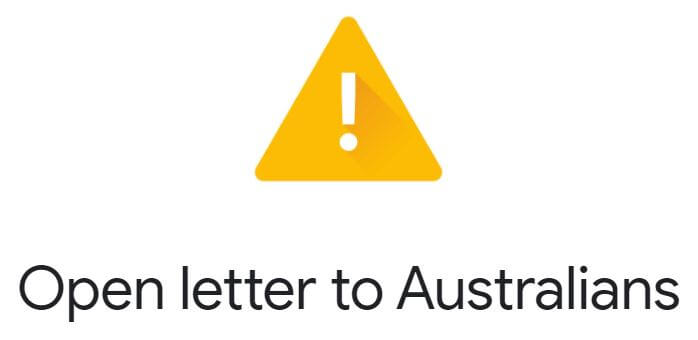On 20 April 2020, while most Australians were bingeing on Netflix, the Australian government quietly asked the ACCC “to develop a mandatory code of conduct to address bargaining power imbalances between Australian news media businesses and digital platforms, specifically Google and Facebook.”
It’s good to see the government appreciates the positive potential of collective bargaining!
In this case, the “bargaining” in question relates to potential payments from Google and Facebook “for the inclusion of news on their services,” in the words of the ACCC. They suggested that Google and Facebook’s monopoly power “resulted in news media businesses accepting less favourable terms for the inclusion of news on digital platform services. Of course, by “less favourable terms,” they meant $0.
Preliminary findings were released on 31 July and public submissions sought. Now, the ACCC is hardly a conversation starter on a slow news day, let alone with Victoria about to declare a state of emergency due to Covid-19.

The issue only hit public consciousness after Google addressed the draft code in an “Open Letter to Australia” published on its home page on 17 August. Google opposed the code by focusing not on payment for content, but other proposed provisions: platforms providing news media with information about user interaction with their content; and advance warning about changes to Google’s search and Facebook’s news feed algorithms.
“The law would force us to give an unfair advantage to one group of businesses,” Google said. “The proposed changes are not fair and they mean that Google Search results and YouTube will be worse for you.”
Facebook weighed in shortly after, claiming that it sends $200m worth of clicks to Australian news sites annually. “The ACCC presumes that Facebook benefits most in its relationship with publishers, when in fact the reverse is true,” Facebook said in a statement. Then it dropped the bombshell: “Assuming this draft code becomes law, we will reluctantly stop allowing publishers and people in Australia from sharing local and international news on Facebook and Instagram.”
This sent the media apoplectic. Ultimo-based journalists wondered whether social media itself would survive. “Can you imagine Instagram or Facebook without the ABC or Australian news sources?” wrote one. Um, yes. In fact, most Instagram users don’t have to imagine it.
Neither do Germans, for that matter. Axel Springer, which publishes Europe’s most read daily newspaper, prevented Google from displaying news snippets in its search results in this exact bid to get the publisher to pay to use its content. It saw such a steep plunge in digital traffic that it reconsidered within a fortnight.
It seems unlikely Australian organisations will fare any better. Of course, whether Google should redirect some revenue back to news media is a separate question.
But then again, who exactly in the media? As the newly bearded, avuncular Kevin ‘I’m-here-to-help’ Rudd commented, “I always get a little bit suspicious when the Murdoch media get really excited about something, and they’re really excited about this code.”
Contrastingly, the journalists’ association called it “a great first step” against “a business model that has literally destroyed newsrooms around the world,” but they questioned whether journalists and independent publications would benefit. The Greens, for their part, called out the politically motivated exclusion of the ABC and SBS from any potentially redistributed revenue.
Everyone wants a piece of the digital news pie, in other words. But sadly, while Nine and Murdoch duke it out with Silicon Valley’s Australian viceroys in PR debate over $200m worth of clicks, we’re still overlooking the fact that Facebook and Google combined have been paying just $44m p.a. in Australian tax. Growing that pie is something we can all get behind.